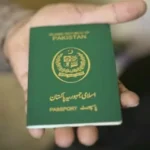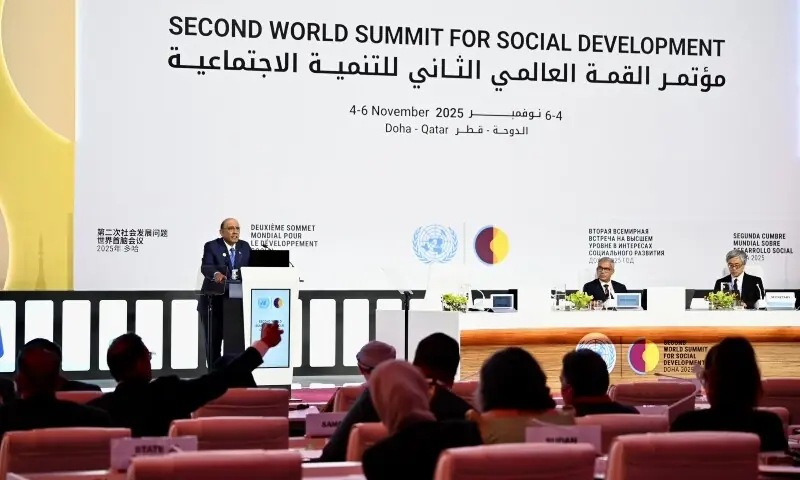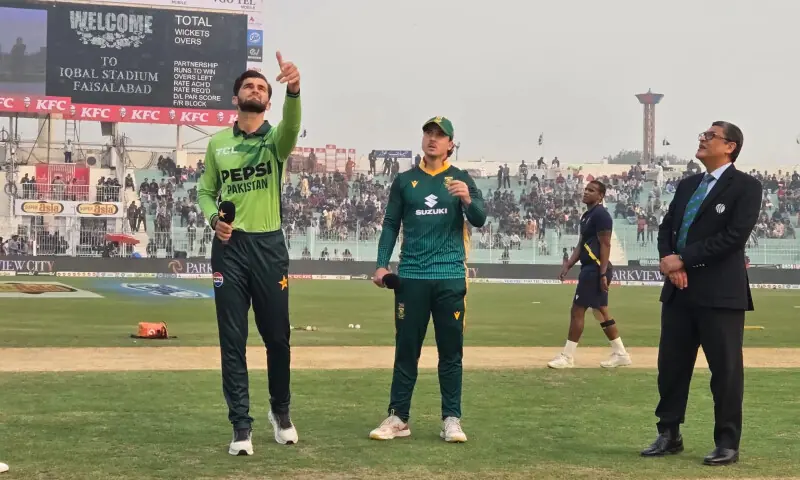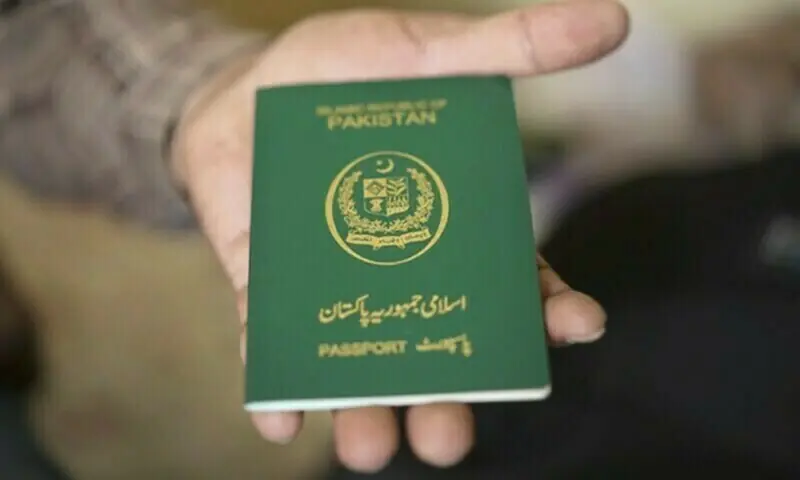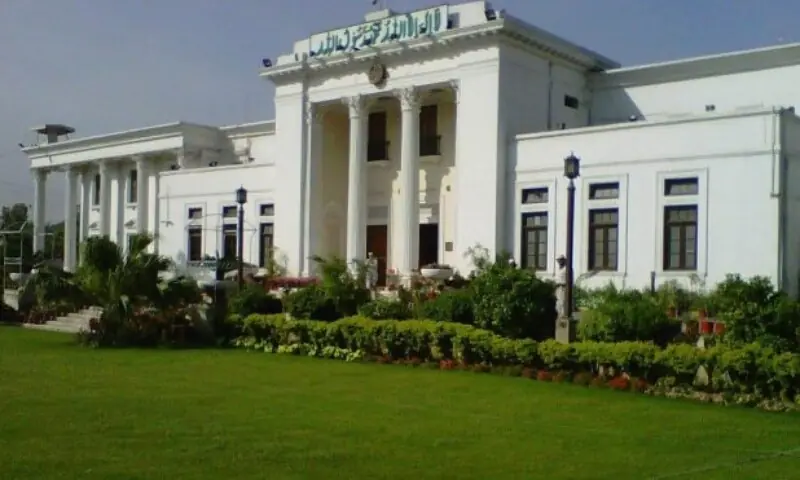President Asif Ali Zardari on Tuesday said India’s violation of the Indus Waters Treaty (IWT) could not and would not succeed, and warned against using water as a weapon.
In April, India put the IWT on hold following the Pahalgam attack in occupied Kashmir that killed 26 people, an incident New Delhi blamed on Islamabad without evidence. Pakistan called any attempt to suspend its involvement in the water an “act of war”, noting that the IWT had no provision for unilateral suspension. He later said he was considering legal action, citing a violation of the 1969 Vienna Convention on the Law of Treaties.
President Zardari addressed the issue during his speech at the Second World Summit for Social Development in Doha, Qatar, saying: “We in Pakistan, on the one hand, are facing the brunt of the impact of climate change, which has caused devastation for our people in the form of large-scale floods… on the other hand, we are facing a new threat in the form of weaponization of water. Water, as everyone knows, is an equal right of any human being and of humanity.”
“We are being threatened from across the border with a new threat in the form of water weaponry, violation of the IWT. This poses a serious threat to 240 million Pakistanis. Such tactics cannot and will not succeed.”
A supplementary award issued in June by the Permanent Court of Arbitration (PCA) in The Hague held that India could not unilaterally keep the treaty in abeyance. India, in response, said it did not recognize the court or its decisions.
According to the IWT of 1960, Pakistan was allotted three west-flowing rivers, and India was allotted three east-flowing rivers. In 2023, Pakistan filed a case with the PCA over the design of Indian hydropower projects on rivers that were awarded to Pakistan under the treaty. The court, in its August ruling on the case, said it had jurisdiction over the dispute and ruled that the treaty “does not allow India to generate hydroelectric power on western rivers based on what might be the ideal or best-practice approach to the engineering” of these projects. Instead, the design of these projects must “strictly” adhere to the specifications set out in the treaty, the court said, adding that India must generally “let flow” the waters of western rivers for the “unrestricted use” of Pakistan.
The President also reaffirmed Pakistan’s commitment to social justice, inclusive development and global solidarity, emphasizing the need to eradicate poverty, promote decent work and ensure equality and human rights for all.
The President expressed full support for the Doha Political Declaration and highlighted that the country’s vision for inclusion and sustainable development aligned with the spirit of the declaration.
“Pakistan remains steadfast in putting people at the center of politics,” President Zardari added.
Showcasing Pakistan’s progress, he cited the Benazir Income Support Program (BISP), which he said had empowered more than nine million families through income assistance, healthcare and education. The initiative, he said, was recognized worldwide as one of the best models of social protection.
He also reaffirmed the country’s commitment to the Sustainable Development Goals, pledging to raise literacy to 90 percent and ensure that all children attend school within five years.
The President also mentioned initiatives such as the National Youth Internship Program and green and resilient housing projects, which aim to empower youth and strengthen climate resilience through nature-based solutions, including mangrove restoration.
Outlining a roadmap to translate the Doha Declaration into action, Zardari urged the world to unite around three pillars: dignity, equality and solidarity, emphasizing global financial reforms, debt relief, equitable taxation and expanding social protection.
Condemning “genocide, apartheid and mass famine” in Palestine, the president also called for a just and lasting peace.
The president also reiterated Pakistan’s unwavering support for the people of Kashmir, linking both struggles as two sides of the same coin in the quest for justice and self-determination.
“Development must begin and end with the betterment of people,” said President Zardari, adding that “we must overcome all differences to embark on a path of compassion and progress for all.”
PPP Chairman Bilawal Bhutto-Zardari also drew the attention of the UN Secretary General to India’s weaponization of water, pointing out that India had unilaterally and illegally suspended the water sharing agreement and had stopped providing data on river discharges, creating man-made disasters in Pakistan.
In a meeting with the UN chief, President Zardari reaffirmed Pakistan’s strong support for multilateralism and the central role of the UN in promoting peace, equity and shared prosperity.
He underlined the importance of resolving long-standing disputes, including Jammu and Kashmir, in accordance with relevant UN Security Council resolutions, and called for reversal of India’s unilateral and illegal measures.
The President also reiterated Pakistan’s principled position on Palestine, highlighting the need to end the suffering of the Palestinian people and defend their right to self-determination by establishing a viable, contiguous and sovereign State of Palestine based on the pre-1967 borders, with Al-Quds Al-Sharif as its capital.
He also appreciated the UN chief’s leadership in addressing global challenges and his continued support to Pakistan.
The President raised the issue of the Jammu and Kashmir dispute, recalling that it remained one of the oldest unresolved items on the agenda of the UN Security Council.
He urged implementation of relevant UN resolutions to ensure a just and lasting solution in line with the aspirations of the people of Kashmir.
President Zardari also highlighted Pakistan’s long-standing contribution to UN peacekeeping operations, noting that Pakistani peacekeepers had served with distinction in conflict zones around the world.
The UN chief acknowledged Pakistan’s important role in maintaining peace and expressed solidarity with Pakistan in its efforts to combat terrorism.
Meetings with their Iraqi and Tajik counterparts
Zardari also met with his Iraqi counterpart, Dr. Abdul Latif Jamal Rashid, and the two reviewed the entire spectrum of bilateral relations and reaffirmed their mutual commitment to further strengthen long-standing ties.
Discussing trade and investment, both sides underlined the importance of improving economic ties through greater business-to-business interactions and facilitating visa regimes.
President Zardari appreciated Iraq’s cooperation in facilitating the arrival of Pakistani pilgrims and acknowledged the valuable contribution of the Pakistani community in Iraq, which served as a bridge of goodwill between the two nations.
The two leaders also exchanged views on regional peace, stability and cooperation, and agreed to maintain regular high-level contacts to advance bilateral relations.
The Iraqi president again invited President Zardari to visit Iraq.
The president accepted the invitation and stated that he would make the visit shortly after the Iraqi parliamentary elections, scheduled for the end of this month.
He also reaffirmed Pakistan’s commitment to further strengthen bilateral cooperation in trade, investment, connectivity, energy, defense and people-to-people exchanges with Tajikistan.
President Zardari said Pakistan highly valued its multifaceted relationship with Tajikistan, rooted in shared history, culture and linguistic affinity.
He noted that the Strategic Partnership Agreement signed in 2024 reflects the growing depth of ties between the two countries. He welcomed the resumption of work on the CASA-1000 project, calling it a flagship initiative for shared prosperity, and invited Tajikistan to explore new avenues of trade and connectivity through Pakistan, including the possibility of restoring direct flights.
President Zardari also praised the successful Dosti-II joint military exercise held in August 2025 and reaffirmed Pakistan’s readiness to assist Tajikistan in defense cooperation and capability development.
The Tajik president invited Zardari to visit the country, which he accepted.
The two leaders also shared perspectives on regional and global issues of common interest.




